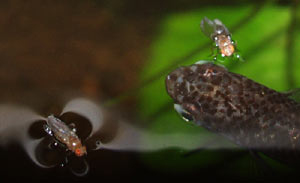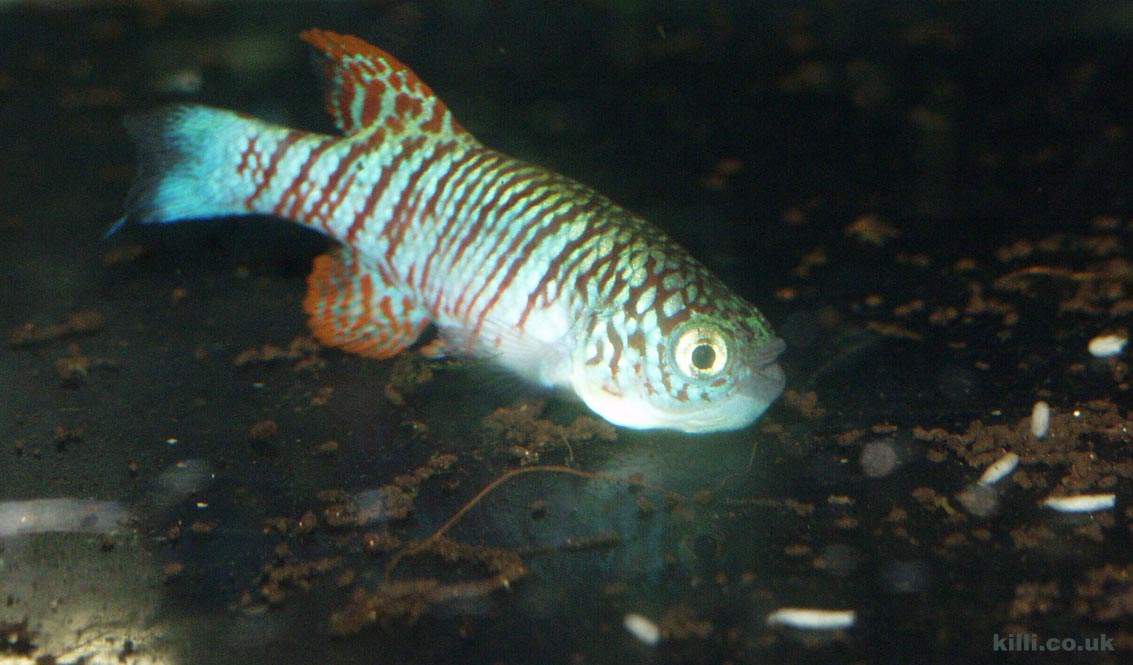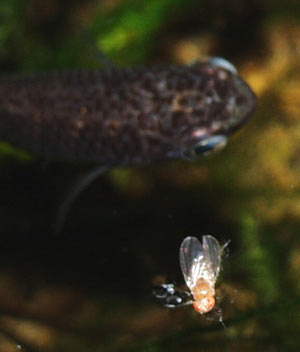Fruit flies, or Drosophila are an excellent food for most small fish, largely representing the natural killifish diet of invertebrates. Flies are the perfect food for surface dwelling fish species, but even killies from the lower strata, like Nothobranchius can be trained to eat them. Drosophila larvae are also a good food for killies, and although rarely a 'favourite' food, are an easy source of small food when worms are not available.

A Rivulus xiphidius eyes up a fruit fly
Feeding fruit fly larvae to killifish
Larvae of any size can be fed to killies to suit their needs. Lots of larvae can be scraped from the sides of their vial, and if a drip of water is added , the rest will make their way out of the media and up the sides. After this you can leave the remaining larvae to hatch turn into flies, or to be really thorough you can add the contents of the vial to a strong (3M) salt solution. The food dissolves away or sinks and the larvae will float, allowing them to be scooped out with a net, rinsed and fed. It is crucial not to over feed with Drosophila larvae, as they drown very quickly (1 hour or less) and although fish do eat them, they do not eat them with the same relish that they enjoy other insect larvae.


Cute fish look evil from above
Feeding with flies
Simple throw them in! The flies float on the surface, sometimes in clumps. If they can get to the sides they will climb out. Feeding fish with fruit flies is easy when the fish are hungry and waiting, however some will always escape. Surface feeders, such as Epiplatys will devour them quickly, however other species need to be trained, not so much to eat them, but to notice that they are there! Unless your fish are mad for fruit flies, only feed a few at a time! Again, 5-8 minutes in a freezer can immobilise flies for some time, but they do wake up after a few seconds in warm tank water.
Fruit fly cultures for sale
Killi.co.uk is funded by its visitors. When you buy through links on our site we may earn an affiliate commission. For more info see
terms and conditions.
Dover, Pennsylvania, 173**, UNITED STATES OF AMERICA
$57
6 pack Melongaster Wingless Fruit Flies
Live fruit flies are a great option for feeding small lizards and many species of frogs, especially because of their reproduction cycle. Each culture of flightless fruit flies has a lifespan of about one month, and even after they die, they will continually pupate from eggs laid by the adults in the culture! This will allow you to keep fruit flies for a while, as long as they are taken care of accurately
Regular fruit flies should be ...
more
Etters, Pennsylvania, 173**, UNITED STATES OF AMERICA
$25
The product is a Flightless fruit fly culture kit + 1 additional container of just-add-flies food designed for dart frogs and reptiles. Produced by the brand Crazy Frog Lady, this product provides a convenient and natural way to feed your pets. The fruit flies are a nutritious food source for many reptiles and amphibians, promoting healthy eating habits and reducing the need for processed diets. With this product, you can easily maintain a steady supply of live insects for your pets to enjoy ...
more
San Juan, Puerto Rico, 009**, UNITED STATES OF AMERICA
$15
Flightless Fruit Fly Culture (Drosophila Melanogaster) Free Shipping
Ship Monday-Wednesday
Live arrival guaranteed
Any question or problem send me a message
...
more
Manchester, Pennsylvania, 173**, UNITED STATES OF AMERICA
$22
Drosophila melanogaster (also known as melanogaster) are likely the most common fruit fly and measure about 1 / 16 of an inch.
For best results store at 75-78°F and 60-80% humidity
This producing culture will be ready to feed from in 3-5 days after arrival.
Live arrive is guaranteed when you select Heat / Cold pack....
more
Dover, Pennsylvania, 173**, UNITED STATES OF AMERICA
$57
6 Pack of 2 different Cultures
Melongaster Flightless Fruit Flies x3
Melongaster Wingless Fruit Flies x3
Live fruit flies are a great option for feeding small lizards and many species of frogs, especially because of their reproduction cycle. Each culture of flightless fruit flies has a lifespan of about one month, and even after they die, they will continually pupate from eggs laid by the adults in the culture! This will allow you to keep fruit flies for a while, as long ...
more
